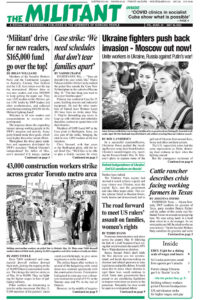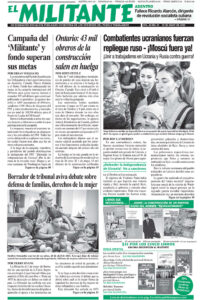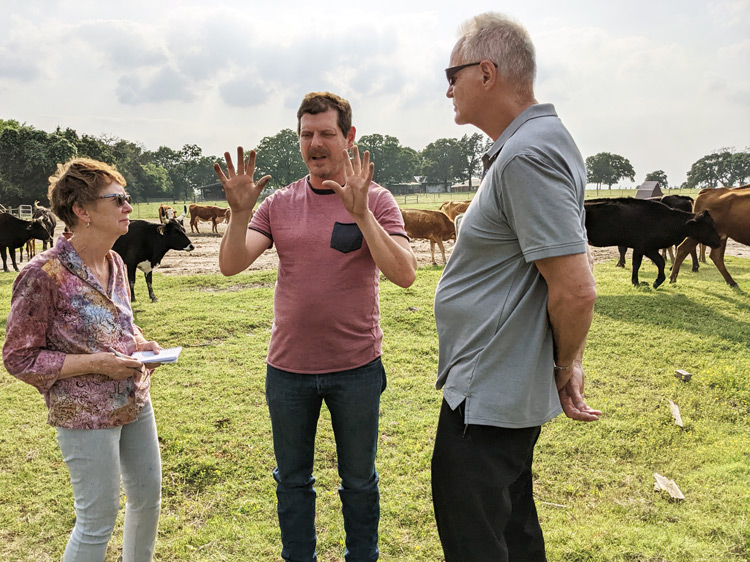FAIRFIELD, Texas — Alyson Kennedy, SWP candidate for governor of Texas, party member Dennis Richter and the author of this article met Nathaniel Turner on a recent campaign trip here. We were eating lunch in a local diner where he is the manager. As we were paying our bill, he asked us why we were in town. “I’m the Socialist Workers Party candidate for governor and we’re here to find out about what ranchers and farmers face and write an article about it for the Militant,” Kennedy said.
Turner said he’s a small-scale rancher and invited us to come back for more discussion. He subscribed to the paper and bought a copy of Teamster Rebellion, where SWP leader Farrell Dobbs describes how party members in Minneapolis in the 1930s helped organize and lead a fighting class-struggle labor movement in the Upper Midwest.
We returned a couple weeks later and he invited us to have lunch in another restaurant where he works as a server. We talked for a couple hours.
Fairfield is in Freestone County, about 100 miles southeast of Dallas-Fort Worth. With a population of 19,500, over 2,000 work on the land, producing livestock, poultry, other animal products, hay and other crops. The 2017 U.S. Agriculture Census says there were 1,799 Caucasian and 440 Black producers on the land there. Some 97% are family farms, and only 22% hire labor.
“Taking your cow to be processed at a slaughterhouse costs 99 cents a pound, about $660 to butcher and package. And it must be USDA inspected or the rancher can’t sell the meat,” he said. “The alternative is to sell your cow to a feed lot. The feed lot fattens the cow and sells it to a packing plant.” Naturally, payments to ranchers are kept as low as possible.
“The price of fuel has doubled,” he added. “Diesel went from $2.20 a gallon to over $5. Fertilizer is up $125 a ton. The cost of hay has more than doubled.”
“Black people have a long history in the area, many coming to farm and ranch after the Civil War. I think because of this history there is less racism against Blacks here,” Turner said. In Texas there are 11,741 Black producers, more than in any other state nationwide, almost a quarter of all Black farmers.
Fight for workers, farmers alliance
“It’s important for the working class to have alliances with small farmers to change this society,” Kennedy said. “There will have to be a revolution in this country so working people can take power and, in alliance with producers on the land, create a different kind of government, a workers and farmers government. That’s what the SWP fights for.
“This won’t happen overnight,” Kennedy said. “But we will begin to see growing struggles by working people in response to a deepening world crisis of the capitalist system today.”
“How is this going to happen?” Turner asked. Richter pointed to the example of the Teamsters union in Minneapolis in the 1930s. “Conditions facing coal haulers led them to fight for big changes. To stand up and fight starts with people like those workers in Minneapolis.”
“Unions are good because you have a voice,” Turner said. “I’ve been reading Teamster Rebellion, and I was impacted when the author said, ‘Do you want to live your whole life as a coward?’”
“To keep your farm here you have to show the federal tax agency you made a profit,” Turner said. A farmer can only report losses for three consecutive years. “Now they’re trying to make into law that a rancher can’t administer antibiotics. Instead, you’ll need to get a vet, so more comes out of a rancher’s pocket.”
“Just a few months after the January 1959 Cuban Revolution, Fidel Castro and the new revolutionary government nationalized the land, guaranteeing that those who farm or ranch would never lose their land as long as they worked it,” Richter said.
After eating, Turner took us to see his 73 cattle several miles from here.
“I grew up in Fairfield where my father was a minister,” Turner said. “I moved to Indiana where I worked in the restaurant and entertainment industry hosting banquets. I moved back 10 years ago and was going to buy some land to ranch until I found out it costs $3,000 an acre. You need to purchase more than 100 acres to get a price break, so it’s inevitable big businesses buy up the land. I rented 90 acres for $27.77 an acre. Being a rancher made me a better person. It made me think about other people.”


